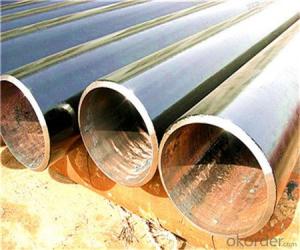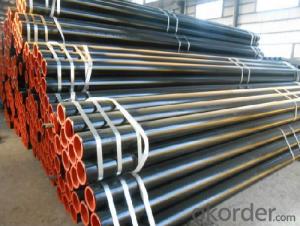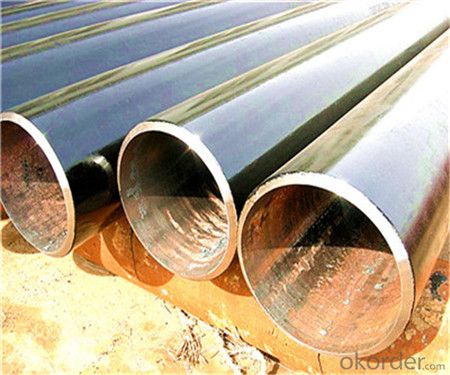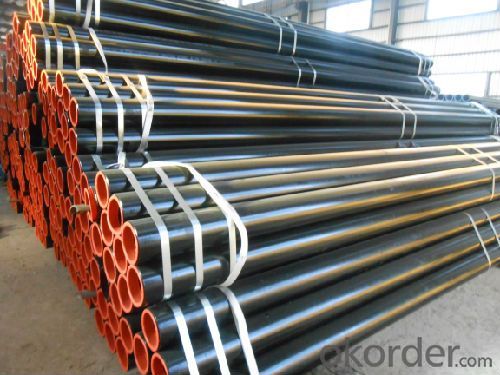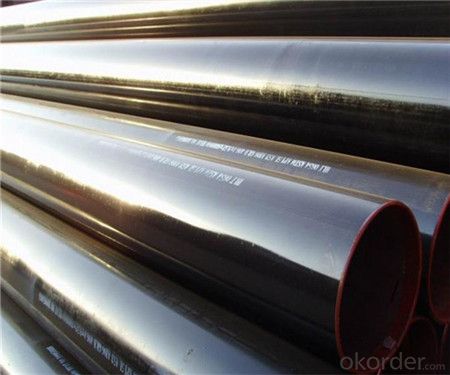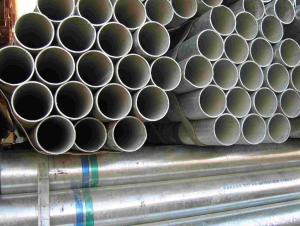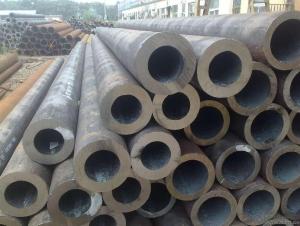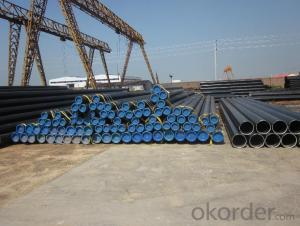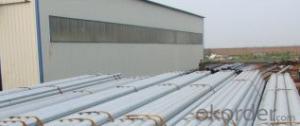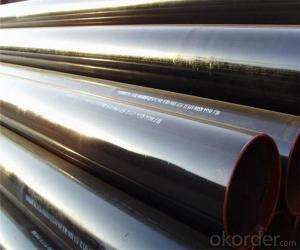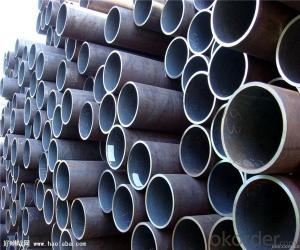Carbon Seamless Steel Pipe from CNBM Group
- Loading Port:
- Tianjin
- Payment Terms:
- TT OR LC
- Min Order Qty:
- 30 m.t.
- Supply Capability:
- 12000 m.t./month
OKorder Service Pledge
OKorder Financial Service
You Might Also Like
1、Structure of Carbon Seamless Steel Pipe API 5L of 4 Inch:
Seamless pipe is formed by drawing a solid billet over a piercing rod to create the hollow shell.
As the manufacturing process does not include any welding, seamless pipes are perceived to be stronger and more reliable.
Historically seamless pipe was regarded as withstanding pressure better than other types, and was often more easily available than welded pipe.
Standard: GB3087: Seamless Steel Tubes for Low and Medium Pressure Boiler
2、Main Features of the Seamless Pipe API 5L of 4 Inch
• High manufacturing accuracy
• High strength
• Small inertia resistance
• Strong heat dissipation ability
• Good visual effect
• Reasonable price
3、Seamless Pipe API 5L of 4 Inch Specification:
Standard | GB, DIN, ASTM ASTM A106-2006, ASTM A53-2007 |
Grade | 10#-45#, 16Mn 10#, 20#, 45#, 16Mn |
Thickness | 8 - 33 mm |
Section Shape | Round |
Outer Diameter | 133 - 219 mm |
Place of Origin | Shandong, China (Mainland) |
Secondary Or Not | Non-secondary |
Application | Hydraulic Pipe |
Technique | Cold Drawn |
Certification | API |
Surface Treatment | factory state or painted black |
Special Pipe | API Pipe |
Alloy Or Not | Non-alloy |
Length | 5-12M |
Outer Diameter | 21.3-610mm |
Grade | 20#, 45#, Q345, API J55, API K55, API L80, API N80, API P110, A53B |
Standard | ASME, ASTM |
4、Packaging & Delivery
Packaging Details: | seaworthy package,bundles wrapped with strong steel strip |
Delivery Detail: | 15-30days after received 30%TT |
5、FAQ of Seamless Pipe API 5L of 4 Inch:
①How is the quality of your products?
Our products are manufactured strictly according to national and internaional standard, and we take a test
on every pipe before delivered out. If you want see our quality certifications and all kinds of testing report, please just ask us for it.
Guaranteed: If products’ quality don’t accord to discription as we give or the promise before you place order, we promise 100% refund.
②How about price?
Yes, we are factory and be able to give you lowest price below market one, and we have a policy that “ for saving time and absolutely honest business attitude, we quote as lowest as possible for any customer, and discount can be given according to quantity”,if you like bargain and factory price is not low enough as you think, just don’t waste your time.Please trust the quotation we would give you, it is professional one.
③Why should you chose us?
Chose happens because of quality, then price, We can give you both.Additionally, we can also offer professional products inquiry, products knowledge train(for agents), smooth goods delivery, exellent customer solution proposals.Our service formula: good quality+good price+good service=customer’s trust
SGS test is available, customer inspection before shipping is welcome, third party inspection is no problem.
6、Seamless Pipe API 5L of 4 Inch Images:
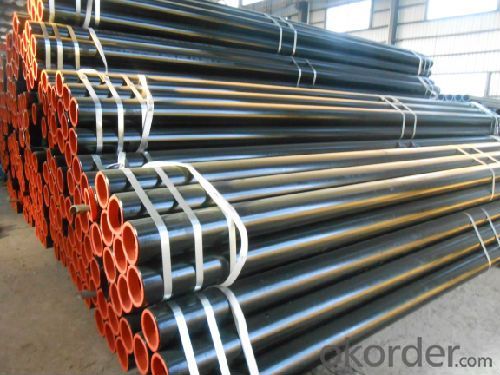
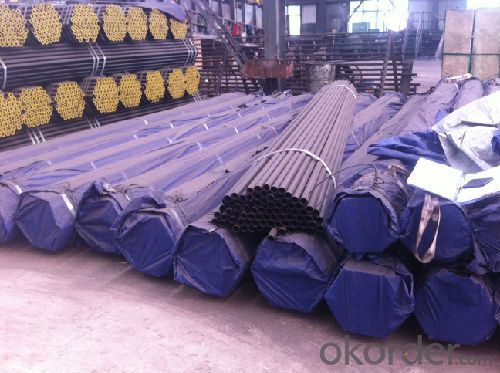
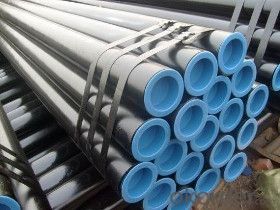
- Q: What does "steel pipe SC" mean?
- SC (run in welded steel duitconSC is the line laying mode GB letter of wire is worn steel pipe laying (welded steel pipe, low pressure fluid) SC70 said the conductor by low pressure fluid DN70 welded steel pipe as protection pipe laying, DN70 said the nominal pipe diameter is 70mm, the nominal pipe diameter is 70mm (a series of values, the actual diameter slightly different).
- Q: Can steel pipes be used for plumbing?
- Yes, steel pipes can be used for plumbing. They are commonly used in commercial and industrial applications due to their durability and strength. However, they are less common in residential plumbing due to their higher cost and the availability of alternative materials such as copper and PVC.
- Q: How do you calculate the pipe thermal expansion for steel pipes?
- To calculate the pipe thermal expansion for steel pipes, you need to consider the coefficient of thermal expansion (CTE) of the material, the temperature change, and the length of the pipe. The CTE is a measure of how much a material expands or contracts with temperature changes. For steel, the average CTE is typically around 12 x 10^-6 per degree Fahrenheit (or 6.5 x 10^-6 per degree Celsius). However, this value can vary depending on the specific grade of steel. Next, determine the temperature change that the pipe will experience. This can be the difference between the operating temperature and the ambient temperature, or the change in temperature due to the fluid or gas flowing through the pipe. Finally, calculate the thermal expansion using the formula: Thermal Expansion = CTE x Length x Temperature Change Where: - CTE is the coefficient of thermal expansion - Length is the length of the pipe - Temperature Change is the difference in temperature For example, if you have a steel pipe with a length of 10 meters (32.8 feet) and a temperature change of 100 degrees Celsius (180 degrees Fahrenheit), and assuming a CTE of 12 x 10^-6 per degree Celsius, the thermal expansion would be: Thermal Expansion = 12 x 10^-6 x 10 x 100 = 0.012 meters (or 12 millimeters) This means the pipe would expand by 12 millimeters due to the temperature change. It's important to note that this calculation provides an estimate of the thermal expansion, but other factors such as pipe supports, restraints, and the specific application should also be considered to ensure the proper design and installation of the steel pipe system.
- Q: What are the advantages of using steel pipes in the mining industry?
- There are several advantages of using steel pipes in the mining industry. Firstly, steel pipes are extremely durable and can withstand high-pressure environments, making them ideal for transporting materials such as water, slurry, and chemicals in mining operations. Secondly, steel pipes are resistant to corrosion, which is crucial in the mining industry where materials are often exposed to harsh conditions and abrasive substances. Additionally, steel pipes have a high heat tolerance, allowing them to handle hot materials without deformation or damage. Lastly, steel pipes are easy to install and maintain, reducing downtime and ensuring smooth operations in the mining industry.
- Q: Are steel pipes suitable for use in automotive industries?
- Yes, steel pipes are suitable for use in automotive industries. Steel pipes are highly durable, have excellent strength-to-weight ratio, and can withstand high pressure and temperature conditions, making them ideal for various automotive applications. They are commonly used in exhaust systems, brake lines, fuel lines, and structural components of vehicles due to their reliability and ability to withstand harsh environments.
- Q: How are steel tubes represented?
- If it is seamless steel pipe, welded steel pipe, the method of expression is: nominal diameter refers to the outer diameter (diameter * wall thickness). The unit is mm. [for example, seamless steel tubes of phi 32 * 3. It means that the nominal diameter (outside diameter) is seamless steel pipe of phi 32mm and wall thickness 3mm.
- Q: What are the different standards for steel pipes?
- There are several different standards for steel pipes, including ASTM (American Society for Testing and Materials), API (American Petroleum Institute), and ASME (American Society of Mechanical Engineers). These standards specify the requirements for various aspects of steel pipes, such as their dimensions, chemical composition, mechanical properties, and testing procedures. These standards ensure that steel pipes meet the necessary quality and safety standards for their intended applications.
- Q: What's wrong with the 3PP anticorrosive steel tube?
- That is, polypropylene corrosion resistant coating of steel pipe, the biggest feature of this anti-corrosion coating is good heat resistance.
- Q: Can steel pipes be used for water treatment plants?
- Yes, steel pipes can be and are commonly used in water treatment plants. Steel pipes have several advantages such as high strength, durability, and resistance to corrosion, making them suitable for conveying and transporting water in water treatment processes.
- Q: What is the maximum operating temperature for steel pipes?
- The specific grade of steel used typically determines the maximum operating temperature for steel pipes. Carbon steel pipes, for instance, can generally endure temperatures ranging from 800-1000 degrees Fahrenheit (427-538 degrees Celsius). On the other hand, stainless steel or high-temperature alloys can withstand even higher temperatures, exceeding 1200-1500 degrees Fahrenheit (649-816 degrees Celsius). To determine the precise maximum operating temperature for a particular type of steel pipe, it is crucial to refer to the manufacturer's specifications or industry standards. This is because varying grades and compositions may have distinct temperature limits.
Send your message to us
Carbon Seamless Steel Pipe from CNBM Group
- Loading Port:
- Tianjin
- Payment Terms:
- TT OR LC
- Min Order Qty:
- 30 m.t.
- Supply Capability:
- 12000 m.t./month
OKorder Service Pledge
OKorder Financial Service
Similar products
Hot products
Hot Searches
Related keywords
